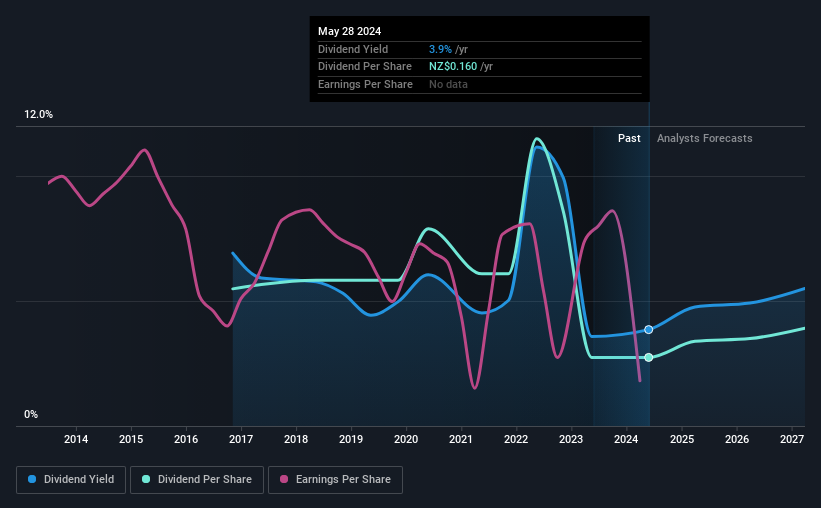Manawa Energy (NZSE:MNW) Will Pay A Larger Dividend Than Last Year At NZ$0.1294
Manawa Energy Limited (NZSE:MNW) will increase its dividend from last year's comparable payment on the 14th of June to NZ$0.1294. This makes the dividend yield about the same as the industry average at 3.9%.
View our latest analysis for Manawa Energy
Manawa Energy's Payment Has Solid Earnings Coverage
While it is always good to see a solid dividend yield, we should also consider whether the payment is feasible. Based on the last dividend, Manawa Energy is earning enough to cover the payment, but then it makes up 99% of cash flows. The company might be more focused on returning cash to shareholders, but paying out this much of its cash flow could expose the dividend to being cut in the future.
Earnings per share is forecast to rise exponentially over the next year. If the dividend continues along recent trends, we believe we could see the payout ratio reaching 79%, which is definitely on the higher side, but still sustainable.
Manawa Energy's Dividend Has Lacked Consistency
Even in its relatively short history, the company has reduced the dividend at least once. Due to this, we are a little bit cautious about the dividend consistency over a full economic cycle. The dividend has gone from an annual total of NZ$0.32 in 2016 to the most recent total annual payment of NZ$0.16. The dividend has shrunk at around 8.3% a year during that period. Generally, we don't like to see a dividend that has been declining over time as this can degrade shareholders' returns and indicate that the company may be running into problems.
The Dividend Has Limited Growth Potential
Given that dividend payments have been shrinking like a glacier in a warming world, we need to check if there are some bright spots on the horizon. Over the past five years, it looks as though Manawa Energy's EPS has declined at around 24% a year. This steep decline can indicate that the business is going through a tough time, which could constrain its ability to pay a larger dividend each year in the future. However, the next year is actually looking up, with earnings set to rise. We would just wait until it becomes a pattern before getting too excited.
The Dividend Could Prove To Be Unreliable
Overall, we always like to see the dividend being raised, but we don't think Manawa Energy will make a great income stock. With cash flows lacking, it is difficult to see how the company can sustain a dividend payment. We don't think Manawa Energy is a great stock to add to your portfolio if income is your focus.
Companies possessing a stable dividend policy will likely enjoy greater investor interest than those suffering from a more inconsistent approach. Still, investors need to consider a host of other factors, apart from dividend payments, when analysing a company. For example, we've picked out 2 warning signs for Manawa Energy that investors should know about before committing capital to this stock. Looking for more high-yielding dividend ideas? Try our collection of strong dividend payers.
Have feedback on this article? Concerned about the content? Get in touch with us directly. Alternatively, email editorial-team (at) simplywallst.com.
This article by Simply Wall St is general in nature. We provide commentary based on historical data and analyst forecasts only using an unbiased methodology and our articles are not intended to be financial advice. It does not constitute a recommendation to buy or sell any stock, and does not take account of your objectives, or your financial situation. We aim to bring you long-term focused analysis driven by fundamental data. Note that our analysis may not factor in the latest price-sensitive company announcements or qualitative material. Simply Wall St has no position in any stocks mentioned.

 Yahoo Finance
Yahoo Finance 
